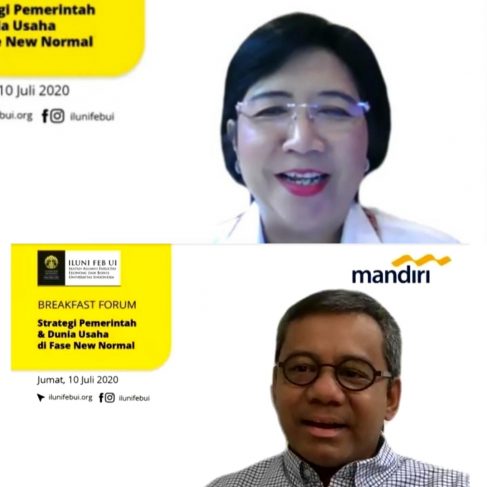ILUNI FEB UI’s Breakfast Forum: Government and Business Strategy for New Normal
Nino Eka Putra ~ FEB UI Public Relations Officer
DEPOK, 10/7/2020 – The Alumni Association of the Faculty of Economics and Business, Universitas Indonesia (Iluni FEB UI) held the first online Breakfast Forum entitled Government and Business Strategy for New Normal, Friday (10/7/2020).
Speakers at the forum were Yongky Susilo, Consultant, The Nielsen Indonesia, who discussed Indonesia Consumer Behavior – Covid19; Adam Gifari, Vice President Director PT Sarana Menara Nusantara, Tbk, who talked about MSMEs Post-Covid-19 Revival; Richie Ardi Putra, Director of Development Sari Ater Group, who discussed How Tourism Suffers During Pandemic; and Budi Nur Mukmin, Head of Grab for Good. The forum was moderated by Andry Asmoro, Chief Economist Bank Mandiri, and was joined by 380 FEB UI alumni.

Destry Damayanti, Chairperson of ILUNI FEB UI, said in her opening remark that the number of Covid-19 cases is still increasing globally, including in Indonesia where the number of new Covid-19 cases reported per day is still high. This has caused a slowdown of or disruption in the national economy. Therefore, entering the new normal, we must develop new habits, such as being agile to new opportunities, adaptive to the Covid-19 protocol, and innovative. Digitalization is the key to mobility, speed, flexibility and security. In addition, extraordinary policies are needed to drive economic recovery, namely fiscal, monetary, macroprudential, microprudential and payment systems policies.
Minister of Finance Sri Mulyani, who was represented by Suahasil Nazara, said in her keynote speech that the government has issued a fiscal policy on Covid-19 handling financing, including budget reallocation (budget cut of Rp190 trillion, spending cut of Rp55 trillion, priority budget distributed through regional governments and ministries/institutions, the first stimulus of Rp8.5 trillion to strengthen the domestic economy through government spending, the second stimulus of Rp22.5 trillion to maintain people’s purchasing power and facilitate export/import), the third stimulus of Rp405.1 trillion (for health support, cash assistance for underprivileged people, support for affected companies) that was increased to Rp.695.2 trillion (an additional Rp87.55 trillion for health financing and Rp607.65 trillion for National Economic Recovery).

Meanwhile, monetary policies were issued to cut the Bank Indonesia benchmark rate, lower the statutory reserve requirement (GWM) for both rupiah and foreign currencies, extend the tenor of government securities and provide hygienic banknotes. Financial policies were also issued to ease loan or financing requirements for MSMEs and to provide loan payment relief for MSMEs.
“Entering the new normal, the government launched the National Economic Recovery (PEN) Program aimed at protecting, maintaining and increasing the economic capacity of business players in running their businesses. The government allocated Rp607.65 trillion for the National Economic Recovery Program. Of the total, Rp205.20 trillion was allocated for the demand side and Rp402.45 trillion for the supply side, “said Suahasil.
Suahasil went on to say that the National Economic Recovery Program is also used as collateral for working capital loan to reduce credit risks of MSMEs, encouraging the disbursement of working capital loan from banks to MSMEs so as to protect or maintain and improve the economic capacity of business players in the real and financial sectors. To that end, the government provides support in the form of payment of guarantee fees (IJP), loss limits to providers of custody services, state capital participation in custody services providers and other risk sharing measures.
Risk mitigation and the strengthening of governance in the implementation of the National Economic Recovery Program are carried out through the amendment of the law on the state budget and the National Economic Recovery Program, consultation with Parliament, cooperation with law enforcement officers, and the establishment of a work monitoring program.
“Basically, burden sharing in the handling of the domino effect of Covid-19 is based on five principles. First, maintaining fiscal space and fiscal sustainability in the medium term. Second, gradually reducing state budget deficit to below 3% starting in 2023. Third, maintaining the stability of the exchange rate and interest rate and keeping inflation under control. Fourth, paying attention to the credibility and integrity of economic, fiscal and monetary management. Fifth, encouraging sustainable economic growth,” said Suahasil by way of ending his session. (hjtp)
(lem)



